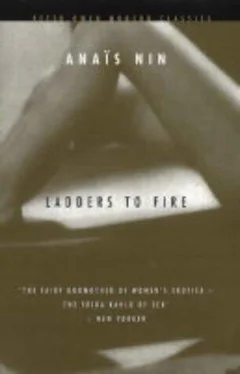Anaïs Nin - Ladders to Fire
Здесь есть возможность читать онлайн «Anaïs Nin - Ladders to Fire» весь текст электронной книги совершенно бесплатно (целиком полную версию без сокращений). В некоторых случаях можно слушать аудио, скачать через торрент в формате fb2 и присутствует краткое содержание. Год выпуска: 2004, ISBN: 2004, Издательство: Peter Owen Limited, Жанр: Классическая проза, Эротические любовные романы, на английском языке. Описание произведения, (предисловие) а так же отзывы посетителей доступны на портале библиотеки ЛибКат.
- Название:Ladders to Fire
- Автор:
- Издательство:Peter Owen Limited
- Жанр:
- Год:2004
- ISBN:9780720611625
- Рейтинг книги:5 / 5. Голосов: 1
-
Избранное:Добавить в избранное
- Отзывы:
-
Ваша оценка:
- 100
- 1
- 2
- 3
- 4
- 5
Ladders to Fire: краткое содержание, описание и аннотация
Предлагаем к чтению аннотацию, описание, краткое содержание или предисловие (зависит от того, что написал сам автор книги «Ladders to Fire»). Если вы не нашли необходимую информацию о книге — напишите в комментариях, мы постараемся отыскать её.
Cities of the Interior
Children of the Albatross
The Four-Chambered Heart
A Spy in the House of Love
Solar Barque
Ladders to Fire — читать онлайн бесплатно полную книгу (весь текст) целиком
Ниже представлен текст книги, разбитый по страницам. Система сохранения места последней прочитанной страницы, позволяет с удобством читать онлайн бесплатно книгу «Ladders to Fire», без необходимости каждый раз заново искать на чём Вы остановились. Поставьте закладку, и сможете в любой момент перейти на страницу, на которой закончили чтение.
Интервал:
Закладка:
“Djuna, take this.”
She handed her a silver medallion she was wearing. “Well, you didn’t win Gerard but you shook him out of hpartly eleath.”
“Why,” said Lillian, “aren’t men as you are?”
“I was thinking the same thing,” said Djuna.
“Perhaps when they are we don’t like them or fear them. Perhaps we like the ones who are not strong…”
Lillian found this relation to Djuna palpable and joyous. There was in them a way of asserting its reality, by constant signs, gifts, expressiveness, words, letters, telephones, an exchange of visible affection, palpable responses. They exchanged jewels, clothes, books, they protected each other, they expressed concern, jealousy, possessiveness. They talked. The relationship was the central, essential personage of this dream without pain. This relationship had the aspect of a primitive figure to which both enjoyed presenting proofs of worship and devotion. It was an active, continuous ceremony in which there entered no moments of indifference, fatigue, or misunderstandings or separations, no eclipses, no doubts.
“I wish you were a man,” Lillian often said. “I wish you were.”
Outwardly it was Lillian who seemed more capable of this metamorphosis. She had the physical strength, the physical dynamism, the physical appearance of strength. She carried tailored clothes well; her gestures were direct and violent. Masculinity seemed more possible to her, outwardly. Yet inwardly she was in a state of chaos and confusion. Inwardly she was like nature, chaotic and irrational. She had no vision into this chaos: it ruled her and swamped her. It sucked her into miasmas, into hurricanes, into caverns of blind suffering.
Outwardly Djuna was the essence of femininity…a curled frilled flower which might have been a starched undulating petticoat or a ruffled ballet skirt moulded into a sea shell. But inwardly the nature was clarified, ordered, understood, dominated. As a child Djuna had looked upon the storms of her own nature—jealousy, anger, resentment—always with the knowledge that they could be dominated, that she refused to be devastated by them, or to destroy others with them. As a child, alone, of her own free will, she had taken on an oriental attitude of dominating her nature by wisdom and understanding. Finally, with the use of every known instrument—art, aesthetic forms, philosophy, psychology—it had been tamed.
But each time she saw it in Lillian, flaring, uncontrolled, wild, blind, destroying itself and others, her compassion and love were aroused. “That will be my gift to her,” she thought with warmth, with pity. “I will guide her.”
Meanwhile Lillian was exploring this aesthetic, this form, this mystery that was Djuna. She was taking up Djuna’s clothes one by one, amazed at their complication, their sheer femininity. “Do you wear this?” she asked, looking at the black lace nightgown. “I thought only prostitutes wore this!”
She investigated the perfumes, the cosmetics, the refined coquetries, the veils, the muffs, the scarves. She was almost like a sincere and simple person before a world of artifice. She was afraid of being deceived by all this artfulness. She could not see it as aesthetic, but as the puritans see it: as deception, as immorality, as belonging with seduction and eroticism.
She insisted on seeing Djuna without make-up, and was then satisfied that make-up was purely an enhancement of the features, not treachery.
Lillian’s house was beautiful, lacquered, grown among the trees, and bore the mark of her handiwork all through, yet it did not seem to belong to her. She had painted, decorated, carved, arranged, selected, and most of it was made by her own hands, or refashioned, always touched or handled or improved by her, out of her very own activity and craftsmanship. Yet it did not become her house, and it did not have her face, her atmosphere. She always looked like a stranger in it. With all her handiwork and taste, she had not been able to give it her own character.
It was a home; it suited her husband, Larry, and her children. It was built for peace. The rooms were spacious, clear, brightly windowed. It was warm, glowing, clean, harmonious. It was like other houses.
As soon as Djuna entered it, she felt this. The strength, the fervor, the care Lillian spent in the house, on her husband and children came from some part of her being that was not the deepest Lillian. It was as if every element but her own nature had contributed to create this life. Who had made the marriage? Who had desired the children? She could not remember the first impetus, the first choice, the first desire for these, nor how they came to be. It was as if it had happened in her sleep. Lillian, guided by her background, her mother, her sisters, her habits, her home as a child, her blindness in regard to her own desires, had made all this and then lived in it, but it had not been made out of the deeper elements of her nature, and she was a stranger in it.
Once made—this life, these occupations, the care, the devotion, the family—it never occurred to her that she could rebel against them. There was no provocation for rebellion. Her husband was kind, her children were lovable, her house was harmonious; and Nanny, the old nurse who took care of them all with inexhaustible maternal warmth, was their guardian angel, the guardian angel of the home.
Nanny’s devotion to the home was so strong, so predominant, and so constantly manifested that the home and family seemed to belong to her more than to Lillian. The home had a reality for Nanny. Her whole existence was centered on it. She defended its interests, she hovered, reigned, watched, guarded tirelessly. She passed judgments on the visitors. Those who were dangerous to the peace of the home, she served with unappetizing meals, and from one end of the meal to the other, showed her disapproval. The welcome ones were those her instinct told her were good for the family, the home, for their unity. Then she surpassed herself in cooking and service. The unity of the family was her passionate concern: that the children should understand each other and love each other; that the children should love the father, the mother; that the mother and father should be close. For this she was willing to be the receiver of confidences, to be the peacemaker, to reestablish order.
She was willing to show an interest in any of Lillian’s activities as long as these ultimately flowed back to the house. She could be interested in concerts if she brought the overflow of the music home to enhance it.She could be interested in painting while the results showed visibly in the house.
When the conversation lagged at the table she supplied diversion. If the children quarreled she upheld the rights of each one in soothing, wise explanations.
She refused one proposal of marriage.
When Lillian came into the house, and felt lost in it, unable to really enter into, to feel it, to participate, to care, as if it were all not present and warm but actually a family album, as if her son Paul did not come in and really take off his snow-covered boots, but it was a snapshot of Paul taking off his boots, as if her husband’s face were a photograph too, and Adele was actually the painting of her above the piano…then Lillian rushed to the kitchen, unconsciously seeking Nanny’s worries, Nanny’s anxieties (Paul is too thin, and Adele lost her best friend in school) to convince herself of the poignant reality of this house and its occupants (her husband had forgotten his rubbers).
If the children had not been growing up (again according to Nanny’s tabulations and calculations) Lillian would have thought herself back ten years! Her husband did not change.
Nanny was the only one who had felt the shock the day that Lillian decided to have her own room. And Lillian might not have changed the rooms over if it had not been for a cricket.
Читать дальшеИнтервал:
Закладка:
Похожие книги на «Ladders to Fire»
Представляем Вашему вниманию похожие книги на «Ladders to Fire» списком для выбора. Мы отобрали схожую по названию и смыслу литературу в надежде предоставить читателям больше вариантов отыскать новые, интересные, ещё непрочитанные произведения.
Обсуждение, отзывы о книге «Ladders to Fire» и просто собственные мнения читателей. Оставьте ваши комментарии, напишите, что Вы думаете о произведении, его смысле или главных героях. Укажите что конкретно понравилось, а что нет, и почему Вы так считаете.












